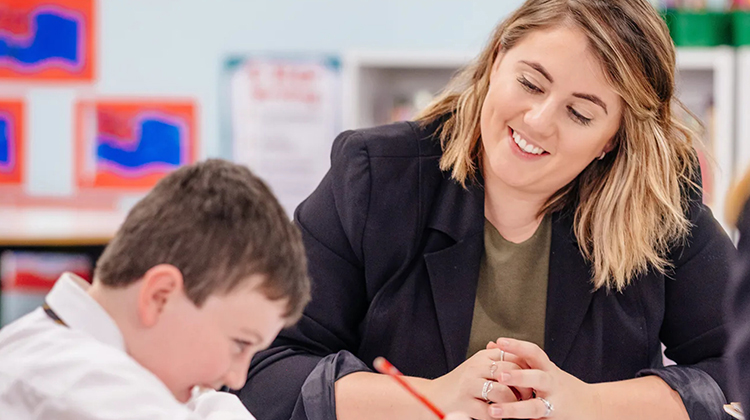Immersive hub model teacher training gains traction

Industry based pathways to work used to be common and their effectiveness is being rediscovered through St Philip’s Christian College and Alphacrucis College’s reformative ‘Hub model’ for tertiary teacher training.
Trainee teachers are immersed in a school environment while they undertake their course with the aim of leaving them classroom ready by the end.
Principal of the Teaching School, Mrs Samantha Van de Mortel, says this localised partnership approach develops teachers who are confident in the theory of teaching practice and all the rhythms of school life.
“Our students are in the classroom from day one of their degree, they are immersed in the community of St Philip’s, relating to the teaching staff and parent community, understanding the ebbs and flows of school life. When they graduate, they are confident and respected teachers who have been in a classroom setting for four years and are passionate and ready to walk into any school environment highly skilled and prepared for school life,” she says.
The St Philip’s Teaching School was launched in 2018 with the belief that the traditional model of teacher training needed to be ‘flipped’ to provide greater input from school communities. That resulted in an in-situ bachelor’s degree within the classrooms of the St Philip’s Christian College group of schools.
Along with the theory of the degree, which is delivered entirely on site through intensives and online learning through the school’s tertiary partner, Alphacrucis College, students are also embedded one to two days a week in a clinical training model, under a mentor teacher, for the entirety of their 4-year degree.
Students move around the different school sites, and different classroom levels and stages. They attend parent teacher interviews, sport, co-curricular, staff meetings and are inducted immersively into education and a specific set of cultures, for a specific industry outcome.
CEO of St Philip’s Christian Education Foundation, Mr Graeme Irwin AM, says, “Teaching is not just understanding a subject matter and then arriving in a classroom and presenting it. It has to be learnt in a school along with the many other dynamics that go along with the school environment.”
President of Alphacrucis College, Professor Stephen Fogarty, described what he saw as the tremendous opportunity for innovative partnerships between higher education, schools, industry and local community.
“COVID provides us with an opportunity once more to focus on raising our educational access and standards, particularly in regional Australia, and the Hub model could change the way we partner in education through the decentralisation of academic capital.”
“There are currently no dual-sector (VET and HE) universities in NSW, and this model provides incredible opportunity to transform a sector in need of reform.”
Along with tertiary teacher training, St Philip’s Christian College has also developed alternate VET pathways to the HSC.
The HSC SmartTrack and the Young Entrepreneurs Scheme (YES), prepare students to be vocationally ready through industry partnerships and tertiary qualifications earned alongside their HSC.
Head of SPCC VET, Carlie Boyle, says this program is already embodying the vision set out in the latest NSW report from Professor Peter Shergold and Mr David Gonski, In the same sentence: bringing higher and vocational education together, by future-proofing students, and raising the profile, quality and cohesion of VET in schools.
“Our VET programs, SmartTrack and YES, have a different ethos and approach to mainstream school with an increased focus on practical learning, enterprise skills and work readiness,” she said.
“Employers want more than qualifications they want employees with social intelligence, adaptive thinking, transdisciplinary and cross-cultural competence, and our programs provide students opportunity to develop these skills as well as completing their HSC.”
One of the keys to success with the VET programs is the way that they are communicated with parents and students.
“Far too often VET is regarded as something to be undertaken only by a student who is perceived to lack academic ability, we have had to work hard to convey to families that these pathways will actually propel you into your chosen industry much faster and often better prepared than the traditional HSC pathway. I believe that this is a message that needs to be more widely presented.”
The hub is attracting interest from government at a state and federal level with Senator Deborah O’Neill – Federal Privileges Committee chair, The Hon Scott Farlow – Parliamentary Secretary to the NSW Treasurer The Hon Mark Latham – Chair of the NSW Education portfolio committee, Mr Clayton Barr MP – Shadow Minister for the Hunter, Water, Innovation and Science, and Tertiary Education visiting the school this week.